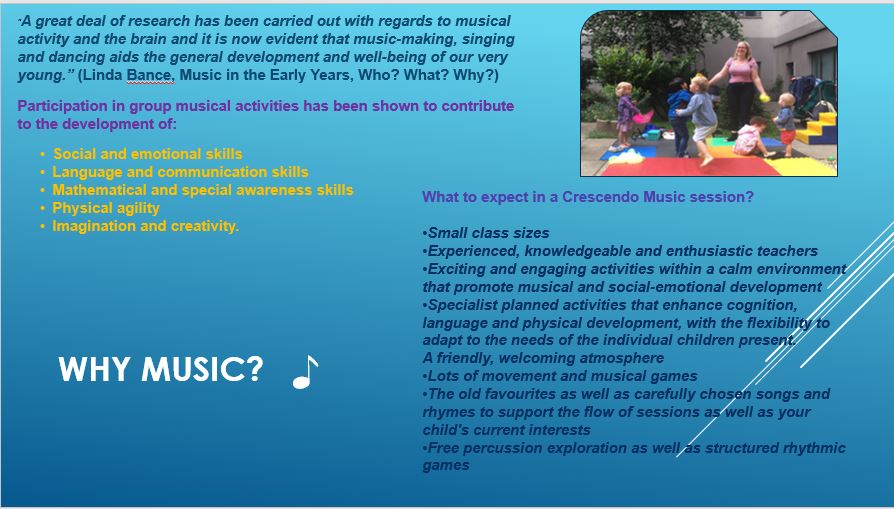 A study by the University of Montreal in 2015 showed that infants remained calm twice as long when listening to a song, which they didn’t even know, as they did when listening to speech. “Many studies have looked at how singing and speech affect infants’ attention, but we wanted to know how they affect a baby’s emotional self-control,” explained Professor Isabelle Peretz, of the university’s Center for Research on Brain, Music and Language. “Emotional self-control is obviously not developed in infants, and we believe singing helps babies and children develop this capacity.” The study involved thirty healthy infants aged between six and nine months. “Our findings leave little doubt about the efficacy of singing nursery rhymes for maintaining infants’ composure for extended periods,” Peretz said. “Even in the relatively sterile environment of the testing room-black walls, dim illumination, no toys, and no human visual or tactile stimulation–the sound of a woman singing prolonged infants’ positive or neutral states and inhibited distress.” The findings are important because mothers, and Western mothers in particular, speak much more often than they sing to their children, missing out on the emotion-regulatory properties of singing. SOURCES: ScienceDaily: https://www.sciencedaily.com/releases/2015/10/151028054532.htm Université de Montréal: http://nouvelles.umontreal.ca/en/article/2015/10/28/singing-calms-baby-longer-than-talking/ DETAILS: BENEFIT: MENTAL HEALTH AND WELLBEING TARGET GROUP: BABIES AGE: 6-9 MONTHS MUSIC TYPE: SINGING TYPE OF STUDY: ACADEMIC RESEARCH NOs INVOLVED: 30 PERIOD OF STUDY: UNKNOWN DATE: 2015 PLACE: CANADA Original Article How two psychologists and an army of babies helped Grammy winner Imogen Heap to write her new happy song for babies.
theconversation.com/we-created-a-song-that-makes-babies-happy-72309 And to see a more in-depth article about the process, click here: medium.com/@CasparAddyman/music-to-make-babies-laugh-fa82d1e73a05 Moving in time to a steady beat is closely linked to better language skills, a study suggests.
People who performed better on rhythmic tests also showed enhanced neural responses to speech sounds. The researchers suggest that practising music could improve other skills, particularly reading. In the Journal of Neuroscience, the authors argue that rhythm is an integral part of language. "We know that moving to a steady beat is a fundamental skill not only for music performance but one that has been linked to language skills," said Nina Kraus, of the Auditory Neuroscience Laboratory at Northwestern University in Illinois. See the full article here. 'Turning their ears on... keeping their ears open' is a research project that was funded by Youth Music exploring the impact of musical activities on the development of pre-school age children.
“We are keen to know how music can help prepare children for primary school and to test to see if skills in numeracy and literacy of pre-school age children are improved because of music making activities.” Youth Music I have posted up the full report as well as the conclusions, which make for very interesting reading... Conclusions (in brief):
Writing a blog is quite new to me, but I felt, now that Crescendo is expanding to numerous classes, nurseries and schools across London, it would be a good way of sharing my passion and belief in how important music is for all young children, from the earliest age.
On so many occasions, I have found myself in a discussion with a parent, or a friend who has asked what I do for a living, where the questions have come up... Can they really understand what you're doing? What do you do with them? Are they not too young to be learning music? Children are innately musical. There is research to show that babies can remember tunes and sound sequences heard whilst in the womb and that a mother's singing can steady the foetal heart rate and reduce kicking. We know that singing can alter a babies' mood and calm it when anxious, or excite and encourage a playful mood - the same could be said for children of any age, or indeed adults. How many of you use music as a way to unwind after a long day, distract you from the stress of commuting, or get you in the mood for a party? This blog will be an opportunity for me to share my own experiences and views as well as articles and documents that I have found interesting and enlightening. Please feel free to share your comments and views. |
Finn RosI am founder and teacher of Crescendo music and believe passionately in the importance of music for the youngest of our children. Here I will share some documents and links to information by experts in the field of music, education and research, specifically in the early years. Archives
August 2021
Categories |

|
|
The Importance of Music
I'm sure you're already aware of some of the important aspects of music and why it is such a beneficial thing for children to be involved in; but I often get asked why I do what I do and whether children this young are really learning anything... you'd be surprised!
I've put together a collection of research documents and information exploring the importance of music for the Early Years and beyond... I'll keep adding to it...

 RSS Feed
RSS Feed